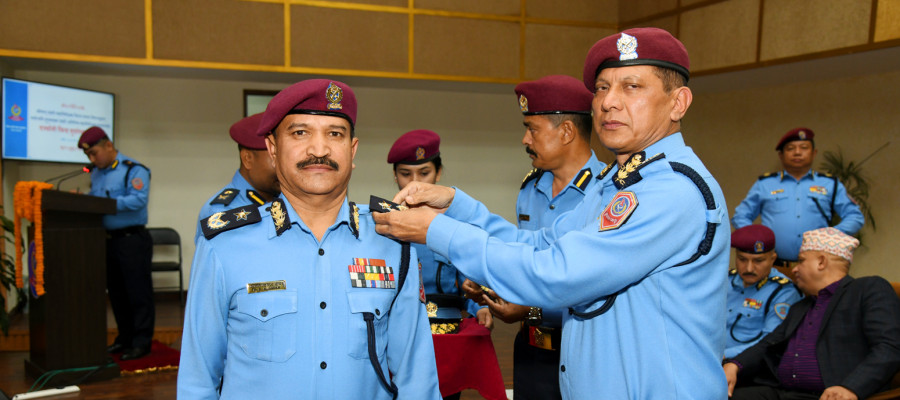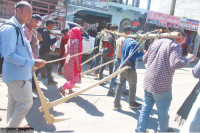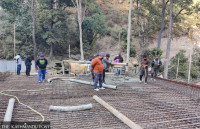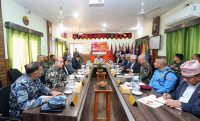National
Concerns after tainted cop’s promotion
Basanta Bahadur Kunwar, who has been promoted to AIG, is reportedly a front-runner for Nepal Police chief.
Binod Ghimire
Victims of the 10-year Maoist insurgency have objected to the promotion of Basanta Bahadur Kunwar to Additional Inspector General (AIG) of Nepal Police. The government on Monday promoted five Deputy Inspectors (DIG) General including Kunwar, Tek Prasad Rai, Deepak Thapa, Shyam Lal Gyawali and Kiran Bajracharya to AIGs.
One of the five AIGs will replace incumbent chief of Nepal Police, Inspector General Dhiraj Pratap Singh, who is retiring on Friday. “The government’s move to promote Basanta Bahadur Kunwar, who was repatriated while at a United Nations Peacekeeping mission for his involvement in human rights violations [is concerning],” the victims said in a joint statement.
Kunwar, who was deployed in the UN peacekeeping mission in Liberia, was recalled in October 2011, within three months of his posting, in connection with his alleged involvement in a 2009 torture case. A youth from Siraha district, arrested on theft charges, was severely tortured in 2009 when Kunwar was serving as the police chief in the district.
Kunwar is one of the major contenders for the police chief position. The government is preparing to appoint a new inspector general of the police on Friday. “Kunwar’s promotion is an example of deep-rooted impunity in Nepal. It shows the government is not serious about human rights issues,” Ram Bhandari, a conflict victim and a human rights activist, told the Post. “Successive governments have been protecting and promoting perpetrators who should actually have been facing legal actions.”
The government is criticised for not doing enough to book human rights violators from the time of the insurgency and later. The National Human Rights Commission often complains against the government for not heeding its recommendations to prosecute hundreds of officials and other people involved in the rights violations.
After the government ignored the rights body’s recommendations, in October 2020 it made public a list of 286 people including former top government and security officials involved in serious human rights violations over the past two decades.
The list included former Chief of Army Staff Pyar Jung Thapa, former home secretary Narayan Gopal Malego and former chief of Nepal Police Kuber Singh Rana.
Rana was implicated for his direct involvement in the enforced disappearance and subsequent killing of five youths in Godar, Dhanusha in 2003 at the height of the Maoist insurgency. The commission, after a thorough investigation, had recommended the government to take action against Rana. However, that never happened. Instead, the then Baburam Bhattarai-led government in 2o12 promoted him to the chief of the police force.
The commission had implicated Malego in a case of excessive use of force by the Nepal Police in Rangeli, Morang during the second Madhesh movement in January 2016.
The constitutional human rights body had also asked the government to bring Thapa to justice as he was leading the national defence force when 49 people were disappeared from the Army’s Bhairavnath Battalion in Maharajgunj between April 2003 and February 2005, but that recommendation went unheeded.
Among the human rights violators implicated by the commission since its formation in 2000, the highest number–98—is from the Nepal Police, followed by 85 from the Nepal Army and 65 from the then CPN (Maoist). The commission has also implicated 16 civil servants, eight Armed Police Force personnel and four teachers.
The commission made public the list of perpetrators after the government repeatedly ignored its recommendation for action. Despite the commission’s move, the government, ignoring its legal obligation, is yet to act on the recommendations.
Officials at the Advocacy Forum Nepal, which has been taking up cases of human rights violations, say Kunwar’s promotion shows the government is least bothered about human rights protection. “Torture is a criminal offence, but Kunwar is yet to be prosecuted,” said Bikash Basnet, a programme manager at the forum.
The victims say promoting a human rights violator to the top police post will give a bad name to Nepal. “We appeal to the government not to promote any police officials with poor human rights records,” the statement added.




 9.25°C Kathmandu
9.25°C Kathmandu














